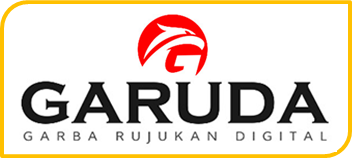CUSTOMER SATISFACTION AND FINANCIAL PERFORMANCE: DOES IT MEDIATE CUSTOMER-CENTRIC ON ISLAMIC BANK VALUES?
Abstract
This study aims to determine the influence of Customer-centric Corporate Social Responsibility (CSR) within the scope of Islamic Ethics on Company Values. In addition, this study also examines the role of customer satisfaction mediation and financial performance towards Customer-centric CSR with company values and tests the role of customer satisfaction mediation for Customer-centric CSR with financial performance. The sample used is Islamic Commercial Banks registered with BI with specified sample criteria. The data was processed using smartPLS, where the direct influence of Centric Customers in Islamic Ethics (CSR) on company values was significant. The Centric Customer variables in Islamic Ethics (CSR) influence financial performance. The other four hypotheses showed insignificant results. The results of the indirect influence test show that the variables of customer satisfaction and financial performance have not been able to mediate the relationship between Customer-centric in Islamic ethics and Company Values.
Keywords
Full Text:
PDFReferences
Anderson, E., Fornel, C., & Lehman, D. R. (1994). Customer Satsifaction, market share and Profitability”. Journal of Marketing, 58 (July), 53-56
Arifin, J., & Wardani, E. A. (2016). Islamic corporate social responsibility disclosure, reputasi, dan kinerja keuangan: Studi pada bank syariah di Indonesia. Jurnal Akuntansi & Auditing Indonesia, 20(1).
Augustine, D. (2012). Good Practice in Corporate Governance. Business & Society, 51(4), 659–676. doi:10.1177/0007650312448623
Dusuki, A.W. (2008). What does Islam say about corporate social responsibility (Corporate Social Responsibility)?. Review of Islamic Economics, Vol. 12, pp. 5-28.
O’Sullivan, D., & McCallig, J. (2012). Customer satisfaction, earnings and firm value. European Journal of Marketing, 46(6), 827–843. doi:10.1108/03090561211214627
Hyunseok, K., Jaisang, K., & Kyeong-Seop, C. (2017) Ambivalent impact of customer satisfaction on firm value in emerging markets: the case of Korea. Journal of Business Economics and Management, 18:2, 258-272, DOI: 10.3846/16111699.2016.1272068
Haniffa, R. & Hudaib, M. (2007). Exploring the ethical identity of Islamic banks via communication in annual reports. Journal of Business Ethics, Vol. 76, pp. 97-116.
Hardianti & Asyik, N. F. (2016). Kinerja keuangan, nilai perusahaan: Corporate Social Responsibility, good corporate governance sebagai variable Moderasi. Jurnal Ilmu dan Riset Akuntansi, 5(4).
Hallowel, R. (1996). The relationships of customer satisfaction, customer loyalty, and profitability: an empirical study. International Journal of Service Industry Management, 7(4), pp. 27-42. © MCB University Press, 0956-4233
Homburg, C., Droll, M., & Totzek, D. (2008). Customer Prioritization : Does It Pay Off and How Should It Be Implemented?. Journal of Marketing, 72 (5), 110-30. https://doi.org/10.1509%2Fjmkg.72.5.110
Iqbal, Z., & Mirakhor, A. (1999). Progress and challenges of Islamic banking. Thunderbird International Business Review, 41(4‐5), 381-405. https://doi.org/10.1002/tie.4270410406
Jenny, L., Youngdeok, L., & Hyung-Il, O. (2018). Does customer satisfaction matter to managers’ earnings forecasts and stock returns?. European Journal of Marketing, https://doi.org/10.1108/EJM-06-2017-0422
Jo, H., & Harjoto, M. A. (2011). Corporate Governance and Firm Value: The Impact of Corporate Social Responsibility. Journal of Business Ethics, 103(3), 351–383. doi:10.1007/s10551-011-0869-y
Kim, Y., & Statman, M. (2012). Do companies invest enough in environmental responsibility? Journal of Business Ethics 105: 115-129.
Kumar, V., Venkatesan, R., & Reinartz, W. (2008), Performance Implication of Adopting a Customer Focused sales Campaighn. Journal Marketing, 72, 50-68 https://doi.org/10.1509%2Fjmkg.72.5.050
Lerzan, A. C., Groening, B., Keiningham, C., Yalcin, T., & Atakan. (2018). Does Customer Satisfaction Lead to an Increased Firm Value?. Gfk Marketing Intelligence Review. 1. 8-15. 10.2478/gfkmir-2014-0073.
Luo, X., & Bhattacharya, C. . (2006). Corporate Social Responsibility, Customer Satisfaction, and Market Value. Journal of Marketing, 70(4), 1–18. doi:10.1509/jmkg.70.4.1
Luo, X., Wieseke, J., & Homburg, C. (2011). Incentivizing CEOs to build customer- and employee-firm relations for higher customer satisfaction and firm value. Journal of the Academy of Marketing Science, 40(6), 745–758. doi:10.1007/s11747-011-0290-1
Luo, X., Homburg, C., & Wieseke, J. (2009). Customer Satisfaction, Analyst Stock Recommendations, and Firm Value, Series: Scientific Working Papers, No.: W 127eThe Institute for Market-Oriented Management
Lee, J. Y., Sridhar, S., Henderson, C. M., & Palmatier, R. W. (2015). Effect of Customer-Centric Structure on Long-Term Financial Performance. Marketing Science, 34(2), 250–268. doi:10.1287/mksc.2014.0878
Morgan, M. R., & Hunt, S. (1994). The Commitment- Trust Theory Of relationship Marketing. Journal Of Marketing. https://doi.org/10.2307/1252308
McDonald, L. M., & Rundle‐Thiele, S. (2008). Corporate social responsibility and bank customer satisfaction. International Journal of Bank Marketing, 26(3), 170–182. doi:10.1108/02652320810864643
Mulyadi, M. S., & Anwar, Y. (2012). Impact of corporate social responsibility toward firm value and profitability. The Business Review, Cambridge, 19(2), 316-322.
Mizik, N., & Jacobson, R. (2003). Trading Off Between Value Creation and Value Appropriation : The Financial Implications Shift in Strategic Emphasis. Journal of Marketing, 67 (January), 63-67.
Purbohastuti, A. W., Bhakti, & Widikusyanto. (2018). Memenangkan Loyalitas Pelanggan Melalui Corporate Social Responsibility Di Pasar Air Minum Kemasan. Jurnal Sains Manajemen. 4(1).
Rashid, M., & Hassan, M. K. (2014). The Market Values of Islamic Banks and Ethical Identity. American Journal of Islam and Society, 31(2), 43–74. https://doi.org/10.35632/ajis.v31i2.289
Rust, R. T., Zahorik, A. J., & Keiningham, T. L. (1995). Return on quality (ROQ): making service quality financially accountable. Journal of Marketing, 59(2), pp. 58-70. American Marketing Association Stable URL: http://www.jstor.org/stable/1252073
Rahmantari, N. L. L., Sitiari, N. W., & Dharmanegara, I. B. A. (2019). Effect of Corporate Social Responsibility on Company Value With Company Size and Profitability as Moderated Variables in Pharmaceutical Companies Listed on the Indonesia Stock Exchange. Jurnal Ekonomi dan Bisnis Jagaditha, 6(2), 121-129. http://dx.doi.org/10.22225/jj.6.2.1352.121-129
Servaes, H., & Tamayo, A. (2013) The Impact of Corporate Social Responsibility on Firm Value: The Role of Customer Awareness. Management Science, 59, 1045-1061. http://dx.doi.org/10.1287/mnsc.1120.1630
Shah, D., Rust, R. T., Parasuraman, A., Staelin, R., & Day, G. S., (2006). The Pasth Customer Centricity. Journal of Service Resesarch. 9(2), 113-24. http://dx.doi.org/10.1177/1094670506294666
Siregar, I. F., Roekhudin, R., & Purwanti, L. (2018). Firm value predictor and the role of corporate social responsibility. Jurnal Keuangan dan Perbankan, 22(3), 475-485. https://doi.org/10.26905/jkdp.v22i3.1804
Storbacka, K., Strandvik, T., & Grönroos, C. (1994). Managing customer relationships for profit: The dynamics of relationship quality. International Journal of Service Industry Management, 5(5), 21-38. https://doi.org/10.1108/09564239410074358
Stemler, S. (2000). An overview of content analysis. Practical Assessment, Research, and Evaluation, 7(17). DOI: https://doi.org/10.7275/z6fm-2e34
Susanti, N., & Restiana, N. G. (2018). What’s the best factor to determining firm value?. Jurnal Keuangan dan Perbankan, 22(2), 301-309. https://doi.org/ 10.26905/jkdp.v22i2.1529
Thaib, I., & Dewantoro, A. (2017). Pengaruh Profitabilitas dan Likuiditas Terhadap Nilai Perusahaan dengan Struktur Modal sebagai Variabel Intervening. Jurnal Riset Perbankan, Manajemen, dan Akuntansi, [S.l.], v. 1, n. 1, p. 25-44, jan. 2017. ISSN 2541-6669.
https://doi.org/10.56174/jrpma.v1i1.6.
Vargo, S., & Lusch, R. (2004). Evolving to a New Dominant Logic. The service-dominant logic of marketing. Dialog, debate, and directions. 68. 1-17. https://doi.org/10.1509/jmkg.68.1.1.24036
Wulandari, N. M. I., & Wiksuana, I. G. B. (2017). Peranan Corporate Social Responsilibility Dalam Memoderasi Pengaruh Profitabilitas, Leverage Dan Ukuran Perusahaan Terhadap Nilai Perusahaan. E-Jurnal Manajemen, 6(3), p. 1278 - 1311, mar. 2017. ISSN 2302-8912. Available at:
DOI: https://doi.org/10.18860/ed.v10i2.16225
Refbacks
- There are currently no refbacks.
Editorial Office:
Megawati Soekarnoputri Building
Faculty of Economics
E-mail: eldinar@uin-malang.ac.id
Universitas Islam Negeri Maulana Malik Ibrahim Malang
E-ISSN 2622-0083

El Dinar under a CC BY SA 4.0 International License.
Member of:
Indexed By:
















